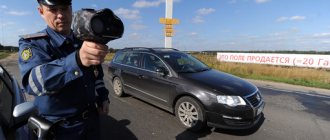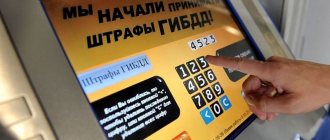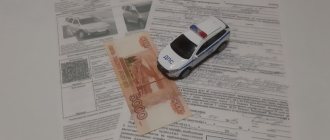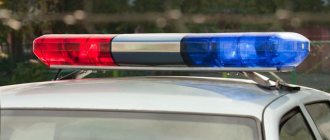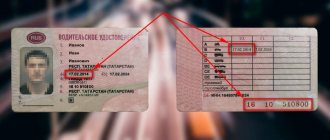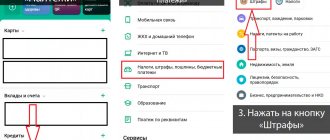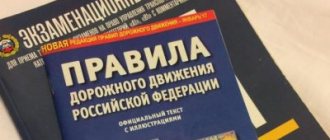Home/Appealing traffic police fines/Appealing a traffic police decision
Violation of safety rules when driving on the roads threatens the motorist with a decision on administrative liability. A resolution is drawn up when a motorist is stopped by a traffic police representative or when a violation is recorded by an automatic video camera. You need to know what to do in a situation where the claims made are unlawful in order to protect your interests. The article discusses the procedure for appealing an illegally issued decision of the traffic police, presenting an example of an application, the deadline for filing it and other related issues.
What is a traffic police resolution?
A traffic police resolution is an executive document drawn up by a representative of the specified structure or a judge during the consideration of a case, outlining the circumstances of the offense and listing the victims, perpetrators and the type of punishment applicable to them.
Attention! If you have any questions, you can chat for free with a lawyer at the bottom of the screen or call Moscow; Saint Petersburg; Free call for all of Russia.
The traffic police resolution is drawn up immediately after the fact of the violation or based on the results of its subsequent consideration in court, within the time limits established by law. An example of a resolution form:
Reasons for filing an appeal against the traffic police decision?
The need to appeal a traffic police decision may be due to the following reasons:
- technical error of the camera during video shooting;
- the desire to fundamentally defend one’s own innocence before representatives of the traffic police;
- another person was driving a car at the time the offense was recorded - the car was being driven by a relative or acquaintance;
- sale of a car and untimely re-registration to the new owner, so messages about penalties are sent to the old address;
- the presence of mitigating circumstances that reduce the amount of the fine imposed, and others.
Attention
It is permissible to file a petition not only for incorrect actions of a representative of an authority, but also for inaction that caused unfair punishment.
To protect yourself, in the event of an inspection by a traffic police representative, when drawing up a resolution and protocol, you must adhere to the following recommendations:
- check the contents of the documents in detail for errors;
- if inconsistencies are identified and the government representative refuses to take them into account in the document, reflect personal opinion when signing the paper;
- it should be persuaded to include in the document the presence of an eyewitness testifying in favor of the accused of an offense;
- will help prove the correctness of video and photo materials taken at the scene of the incident or filmed by the registrar;
- if there are empty lines in the readings, they should be crossed out to eliminate the possibility of unwanted filling;
- You should receive a copy of the document, which will help you take care of your own protection in a timely manner.
IMPORTANT
It is necessary to understand the difference between the resolution and the traffic police protocol. The first document records the fact of the violation, confirms the guilt of the violator and establishes the amount of the fine. In the second (when drawing up a protocol), the circumstances of the incident are set out without drawing conclusions about its causes and those responsible.
How to challenge a traffic police report
Next, you need to discuss in more detail the plan of action if a protocol has been drawn up against you with which you do not agree. What is the correct action? There are several options.
Some believe that it will be easier to challenge a traffic police administrative violation report if there is no signature on it at all. No signature - no problem. However, even without your autograph, the document is valid and the challenge procedure cannot be automatically canceled.
Read about liability for driving without insurance here.
To begin with, it is worth noting that the presence of the protocol itself does not mean that you are being fined. A resolution has been provided for these purposes. However, what is contained in the record may affect what is contained in the order and what decision the magistrate judge makes in your case.
How to correctly value a chain of facts? It is necessary to understand that there is no point in protesting the puncture itself. You need to find inconsistencies with the rules in the actions of the traffic police officer and play on it. If you file a complaint with your boss about the actions of the inspector, provide compelling evidence, this will help you cancel the protocol.
Correct actions at the scene of an incident
To make the challenge process easier, you need to know how to sign the protocol and what to write in the section intended to explain the violator. Don't forget to mention these details:
- the traffic police officer did not explain your rights;
- did not involve all witnesses;
- behaved rudely and so on.
The following tips will help the driver see how to challenge a traffic police report on an administrative violation.
- It is very important to change the line that says you are an offender to “driver.” This way you will show that you do not agree with the fact that you broke the rules and, even more so, with the punishment that may follow.
- You must not leave blank lines.
- Enter the witnesses yourself if the inspector does not want to do this.
Now that a fully competent protocol on the violation is at your disposal, you can safely draw up a petition. Explain any details in this paper that you disagree with. Point out the actions of the inspector that violated your rights. Be brief but precise, objective and discreet.
In order to submit this petition to the head of the department, you have 10 days from the date of receipt of a copy of the document. Most often, the countdown begins from the day the protocol is drawn up. The sooner you do this, the better.
You will soon find out whether your protocol is canceled or not. If the head of the department does not want to take your appeal into account, then you will be issued a decree indicating the amount of the fine.
Now you should consider how to challenge the traffic police protocol in court if your efforts to challenge it in lower authorities were unsuccessful.
Deadlines for appeal
The deadlines for filing an application are indicated in Art. 30.3 Code of Administrative Offences. It is provided that a petition may be filed within ten days after a copy of the traffic police decision was served or received.
For your information
The second part of this article states that it is possible to restore the missed deadline for appealing the traffic police decision. A statement about this is sent to a higher authority in relation to the one who made the decision to prosecute.
When drawing up a petition to restore the deadline for appealing a traffic police decision, you must indicate:
- the name of the authority where an application to appeal the traffic police decision is submitted;
- position, full name of the person to whom the paper is addressed;
- document's name;
- the essence of the issue is stated, listing the circumstances of the case, valid reasons for missing the deadline for appeal, by whom and when the decision on the administrative offense was made;
- list of attached documentation.
At the end of the application, the author signs and indicates the current date.
Valid reasons include the following circumstances, confirmed by such documents:
- serious illness - sick leave, medical report and other papers establishing a diagnosis, in which the complaint physically could not be submitted in a timely manner;
- urgent business trip - an order for a business trip indicating the start and end date, the city where the employee was sent;
- caring for an infirm relative - medical confirmation with a note indicating the need for constant supervision of the patient;
- natural disaster, accident and other incident of a natural or man-made nature that creates an insurmountable obstacle to filing a complaint within the prescribed period - issued by a representative of the Ministry of Emergency Situations or another organization whose area of responsibility includes taking safety measures in connection with these circumstances;
- a copy of the traffic police resolution was not received or was delivered with a delay.
Without providing documented evidence, the application will not be considered with a positive result. The possibility of restoring missed deadlines due to objective reasons is set out in letter of the State Customs Committee of the Russian Federation dated March 27, 2003 N 27-14/13306.
If the stated circumstances are considered justified, the official, based on the results of consideration of the submitted petition, decides to restore the missed appeal period.
An example of a petition to restore the deadline for appealing a traffic police decision is presented here.
How to appeal a traffic police administrative violation protocol
In relation to a citizen who has committed an administrative offense in the field of road safety, a traffic police officer draws up a protocol. On its basis, a decision is made determining the punishment. The resolution can be appealed in the manner prescribed by Chapter 30 of the current edition of the “Code of the Russian Federation on Administrative Offenses” dated December 30, 2001 N 195-FZ (Administrative Code of the Russian Federation).
- Introductions. Information about the body to which the complaint is filed, the applicant and his defense attorney (representative); Brief facts of the case.
- Descriptive part. The numbers, dates, by whom, when and in relation to whom the protocol and resolution on the case were drawn up are indicated. And the legal qualification of the act.
- Motivational part. Explanation and argumentation of the applicant’s position on the merits of the case. Requests and petitions are listed.
- The petition to summon and interrogate witnesses shall indicate their full names and residential addresses.
- In the petition to appoint an examination, we formulate the questions that are submitted for examination, indicate the expert institution in which we ask to appoint the examination.
- Expertise ordered by the court is paid for from the federal budget.
- Conclusions The applicant's demands addressed to the person considering the complaint. Indications of the provisions of law on the basis of which the applicant requests an appropriate decision; a list of documents attached to the complaint.
Institutions for filing a complaint
The choice of the authority where you need to file an application to appeal the decision of the traffic police depends on who made the decision to bring to administrative responsibility:
- if this is a court, the complaint is sent to the appropriate higher authority;
- collegial authorities - similar regional structures;
- officials - their leaders within a given region;
- other structures - to the district courts of the subject where the case was heard.
Art. 28.3 of the Code of Administrative Offenses determines the need to appeal court decisions only to higher authorities of the specified branch of government.
In some situations, it is possible to submit a petition to the traffic police; this will be discussed below.
It is necessary to file a complaint with the judicial authorities if we are talking about serious violations of the traffic police related to the following circumstances:
- causing damage to the health of other people as a result of a driver’s mistake;
- repeatedly crossing a double continuous marking line or exceeding speed limits by more than sixty kilometers per hour;
- driving while intoxicated of various types;
- driving a car without a driver's license.
Please note:
If the consideration of the issue is related to controversial issues, is associated with procedural violations or incorrect interpretation of legislative acts, it is necessary to contact the judicial authorities.
published: Small Town. No. 3. 2007. (printing organ of the Chamber of Commerce and Industry of the Mozhaisk region)
Attention! Currently, the legal defense tactics outlined in the article below are no longer effective. Since approximately 2008, we have been using other methods of judicial protection for drivers brought to administrative liability. You can find examples of our successful judicial practice in disputes with the traffic police in the section Our judicial practice.
A court decision made in October 2006 by a magistrate in one of the Moscow region's judicial districts actually acquitted a driver who was driving while intoxicated and admitted drinking alcohol at the time of his arrest, and once again proved that traffic police officers themselves must comply with every letter of the law. .
The “hero” of this story, being guilty in fact, got away “scary” due to the fact that the traffic police officers themselves do not comply with all the rules of the law. We do not support our “hero” from a moral point of view, but we are reproducing this story to help those drivers who may actually be victims of bias on the road from traffic police officers.
In August of this year, Kirill Petrovich Ivanov approached us (we are not authorized to reproduce the true surname, first name and patronymic of the culprit) with a request for legal assistance. Kirill Petrovich was returning in his personal car with his friends from fishing. While intoxicated, he was stopped by traffic police officers. After passing the relevant medical examinations, Ivanov’s driver’s license was confiscated until the court’s decision was made.
The client asked us to prove in court that he was absolutely sober, and the case was fictitious and fabricated by “limitless” police officers. The situation with the deprivation of rights was aggravated by the fact that Kirill, being an extremely improvident person, giving his own written explanations in the protocol on an administrative offense drawn up by the traffic police officers, noted the following: “I do not agree with the protocol drawn up against me, because drank a bottle of beer, which is not a significant violation” (after the trial, the defendant admitted to us that in reality he and his friends drank about two bottles of vodka). Thus, the defendant did not deny that he drank alcohol.
So, there is a violation of paragraph 1 of Article 12.8 of the Code of Administrative Offenses “Driving a vehicle by a driver who is in a state of intoxication, transferring control of a vehicle to a person who is in a state of intoxication,” according to which punishment is provided in the form of deprivation of the right to drive vehicles for a period of from one and a half to two years.
The evidence base of the traffic police officers consisted of the following documents:
1. A protocol on an administrative offense, drawn up in accordance with paragraph 1 of Article 12.8 of the Code of Administrative Offences, in which the driver agrees with the fact of his alcohol intoxication.
2. The results of a medical examination carried out in a medical hospital, showing a significant level of alcohol in the driver’s blood.
Due to the fact that these documents were clearly not in favor of the accused, the main task of the defense was to prove that these documents appearing in the case were drawn up with any violations, and, accordingly, could not be included in the case. It was also necessary to find arguments to convince the judge not to punish the driver at all.
The defendant explained the fact of alcohol content in the body by the fact of drinking “just one bottle of beer,” but a day before driving. This also explained the improvident handwritten entry of the accused in the administrative offense report, confirming the fact of drinking a bottle of beer: they say, the driver was confused and wrote that he drank beer, but he had been drinking it for quite a long time. The material basis of evidence for Kirill’s position was provided by a cash receipt presented to him from one of the local beer bars with the required (at least one day before the incident) date of purchase of a 0.5 liter bottle of beer. The fact that the cash receipt was presented from the bar, and not from the store, played a significant role in this case. After all, buying alcohol in a bar usually involves consuming it on the spot immediately after purchase.
So, the defense had at its disposal a document explaining the presence of alcohol in the driver’s blood and proving how long ago he had been drinking alcohol. Referring to this document, the defense substantiated its position: at the time the car was stopped, the driver was not intoxicated due to the passage of a sufficiently long time (more than a day) from the moment he consumed alcoholic beverages.
In addition, Kirill presented medical certificates and a copy of an extract from his medical history, indicating that he was unable to drink excessive amounts of alcohol: the driver actually had liver problems and even underwent a course of hospital treatment at one time.
In the process of preparing for the trial, the defense revealed the fact of incorrect behavior of traffic police officers. The police captain who stopped the car did not introduce himself, the driver received offers to “settle everything amicably”, the keys to the defendant’s car were confiscated while he was undergoing a medical examination at the hospital, which was a gross violation of his constitutional rights. The driver was not familiarized with the contents of Art. 51 of the Constitution of the Russian Federation (no one is obliged to testify against himself, his spouse and close relatives, whose circle is determined by federal law) and Art. 17.9 of the Administrative Code (deliberately false testimony of a witness, explanations of a specialist, expert opinions or deliberately incorrect translation). In addition, the defendant’s car, at the time of his medical examination, was unattended on the highway at the place of his stop and, as a result, suffered from the actions of hooligans who tore off the rear bumper. These facts were stated by the defense in its legal objections to the prosecution.
The most difficult task for the defense was to refute the results of the medical examination. It was found that the medical examination of the driver was carried out with the following violations:
1. Monitoring of the results of determining alcohol in exhaled air was carried out twice and on the same device, without the use of personal hygiene products with a mouthpiece already on, which contradicts Appendix No. 3 to Order of the Ministry of Health of the Russian Federation dated July 14, 2003 N 308 “On medical examination for intoxication" (as amended on September 7, 2004) - Instructions for conducting a medical examination for intoxication of a person who drives a vehicle and filling out registration form 307/u-05 "Act of medical examination for intoxication of a person who drives a vehicle" (Appendix to Order of the Ministry of Health and Social Development of the Russian Federation No. 1 of January 10, 2006).
2. Between the first and second sobriety control, no more than 1-2 minutes passed, although in the Order of the Ministry of Health of the Russian Federation of July 14, 2003 N 308 “On medical examination for intoxication” (as amended on September 7, 2004, January 10 2006) states that at least 20 minutes must pass between the first and second sobriety checks, and the doctor should have suggested rinsing the mouth, but this was not done.
3. The Romberg test and coordination tests were not performed.
4. After the driver breathed into the device, the values on the device changed; they were not shown to the accused.
The fact that a medical examination was carried out with violations was also proven by the amount of time spent completing all examination procedures (the time the vehicle was stopped and the start time of drawing up a protocol on an administrative offense is recorded in the protocol):
— in accordance with the administrative violation protocol, the driver’s vehicle was stopped at 21:40;
— about 5 minutes were spent passing the test for alcohol intoxication at the place where the vehicle was stopped (21:45);
— about 10 minutes were spent on drawing up a referral document for an additional medical examination (21:55);
— about 25 minutes were spent on the trip from the place where the vehicle stopped to the hospital (22:20);
- upon arrival at the hospital, about 15 minutes were spent on conducting the examination, and on the doctor filling out the results of the examination (22:35);
— the administrative violation report began to be filled out at 10:40 p.m.
Thus, the procedures established by Appendix No. 3 to Order of the Ministry of Health of the Russian Federation dated July 14, 2003 N 308 “On medical examination for intoxication” (as amended on September 7, 2004, January 10, 2006) were completed in just 15 minutes , which is an obvious falsification of the examination results by the doctor.
It is worth noting that the driver, after undergoing a medical examination, made a statement that he did not agree with the recognition of him as being intoxicated and insisted on additional examinations. The doctor who conducted the examination did not respond to the driver’s request.
The court's attention was drawn to the fact that the driver insisted on additional laboratory testing of biological media (i.e., urine or blood analysis). Indeed, in accordance with clause 11 of Appendix No. 3 to Order of the Ministry of Health of the Russian Federation dated July 14, 2003 N 308 “On medical examination for intoxication,” the basis for the conclusion about the condition of the person being examined is the data of a comprehensive medical examination, taking into account the results of laboratory tests.
In addition, it was found that the hospital where the examination was carried out does not have a specialized drug treatment department. It also remained unclear whether the doctor, who so ignorantly conducted the examination, had a license to conduct it (later during the trial, the doctor stated that he did not have any special training to conduct medical examinations for alcohol intoxication, and was a pediatrician by specialty ).
The court's attention was also drawn to the fact that after drawing up a report on the administrative offense, the driver's keys to the car were returned and he then drove it independently. The traffic police officers, having allowed this to happen, gave the defense another “trump card”: there were witnesses who confirmed that the driver of the vehicle, after drawing up a report on the administrative offense, continued to drive the car independently. It turned out to be a paradox. The traffic police officers, having detained the offender in a state of intoxication, entrusted him with further control of the vehicle. This fact served as evidence for the court that the offense was fictitious.
Based on all this, the defense asked the court not to include in the case the results of the driver’s medical examination confirming the presence of alcohol in his body and when making a decision not to be guided by the Protocol on an Administrative Offense due to the actual absence of an administrative offense.
The court was put in an extremely difficult situation: on the one hand, there were correctly drawn up (correctly drawn up here does not mean that they are valid) results of a medical examination of the driver regarding his alcohol intoxication, testimony of witnesses from among the traffic police officers, the driver’s “confession” in the report on the use of them bottles of beer; on the other hand, the court was shown physical evidence (cash receipt, medical certificates of health), gross violations committed by the doctor during his medical examination of the driver, unlawful and illogical behavior of traffic police officers.
The defense's requests to call additional witnesses (passengers, a medical expert), satisfied by the court, delayed the consideration of the case. The trial was postponed several times. As a result, the date set by the court for making a decision coincided with the date when the deadline established by law (Article 4.5 of the Code of Administrative Offenses of the Russian Federation) for considering cases of administrative offenses expired (two months from the date of commission of the offense). According to paragraph 6 of Art. 24.5 of the Code of Administrative Offenses of the Russian Federation, the expiration of the statute of limitations for bringing to administrative responsibility is a circumstance that excludes proceedings in a case of an administrative offense.
This circumstance created favorable preconditions for the court, which was in a difficult position in which direction to tilt the scales of justice, to make a truly “Solomon” decision.
The case is about an administrative offense under Art. 12.8 Part 1 of the Administrative Code in relation to Kirill Petrovich Ivanov was terminated due to the expiration of the statute of limitations for bringing him to administrative responsibility. The driver's driver's license was returned.
After the trial, the judge admitted that she was forced to make such a “Solomon” decision acquitting the offender, for the first time in her many years of practice, thanks to the inventive position of the defense.
In conclusion, I would like to note that helping a person who put not only his own, but also other people’s lives in danger while driving while drunk is, of course, wrong and contrary to any moral standards. However, this example shows that the prosecution (traffic police officers) must act in all situations only within the framework of the law, observing every letter of it.
This material may be useful to many drivers who actually encounter “police lawlessness” on the roads, which is currently being actively discussed at all levels of government and in society. After all, individual traffic police officers are so accustomed to their impunity and permissiveness that they often perform their service in bad faith. This creates precedents of this kind, when truly guilty drivers get away with it. Moreover, those car owners who become innocent victims of illegal actions of traffic police officers can and are obliged to successfully defend their rights in court.
Pavel Smyslov, corporate lawyer
When using and quoting material, a link to the site is required!
Drawing up an application
The legislation does not establish a strictly regulated form of an application to appeal a decision of the traffic police, however, when drawing it up, it is necessary to be guided by the general rules of office work.
The application includes the following components:
- introductory – to whom the paper is addressed, indicating the address and name of the authority, position, full name of the official recipient, a link to the details of the case to be considered;
- installation – description of brief circumstances of the violation;
- motivation - a continuation of the previous part, indicating objective facts obtained as a result of consideration of the issue, points and names of regulatory documents that must be followed;
- final – sets out the conclusion on the need to cancel the previously adopted resolution with reference to the current legislative norms;
- attachments - a list of documentation is provided confirming the correctness of the arguments presented (witness testimony, photos, video materials, audio recordings, etc.).
The preparer must sign at the end of the document indicating the transcript of the signature and the date of preparation of the petition. An example of an application to appeal a traffic police decision is presented here.
Appealing the traffic police decision in the traffic police department itself
To appeal an unfair decision of the traffic police, it is not necessary to go to court. In some cases, it is possible to solve the problem at the traffic police department. A complaint may be sent to this authority if:
- The document was compiled with errors; a discrepancy was found between the actual state numbers and those indicated in the resolution and presented in photo or video evidence.
- The violation was caused by a team of a street traffic police officer and was recorded by video recording in automatic mode.
- The old owner of the car is wrongly punished because the buyer did not have time to register the car in his name after purchase. As a result, the information in the traffic police databases is not updated, and when a resolution on a violation recorded by a video camera during automatic recording is sent by mail, the punishment papers are sent to the previous owner.
Attention
The responsible traffic police officer who is considering the submitted application has ten days within which a decision must be made with notification to the person who sent the paper.
Complaint against a decision to impose an administrative fine
If the driver does not agree with the decision to impose a fine by the traffic police, he can file a corresponding complaint.
Quite often, the reason for a complaint can be a decision to video record a violation.
We invite you to read: Registration of a lease agreement for non-residential premises in 2021: procedure and deadlines
In this case, you need to file a complaint with the traffic police department that issued the decision (its details are indicated in the decision). In this case, the text of the complaint must contain evidence of your innocence with references to clauses of regulatory legal documents.
Which court should I go to if my appeal to the traffic police is refused?
If the decision cannot be appealed to the traffic police, the issue can be resolved positively in the following instances:
- in the senior management of the traffic police;
- in the district, regional, regional, supreme judicial body;
- from an official or service responsible for the execution of administrative legislation, if necessary, to reduce the amount of the imposed fine.
Attention:
The complaint is submitted to a higher authority than the one that made the decision on punishment.
Appealing the traffic police decision in court
The completed application in the manner specified above is delivered to the appropriate authority. The choice of delivery method is up to the applicant. The petition can be brought directly to the required address, delivered by mail or sent electronically.
If the paper is brought directly to the court or other body, you should prepare a copy of the set of documents to be served or prepare it in duplicate. When submitting the application and attached papers, the representative of the structure must indicate the incoming number and date of receipt.
If you send documents by mail, you must select the form of a letter with return notification of receipt.
For your information
These measures will make it possible to fix the date from which the time allocated by law for consideration of the application will begin.
The official must make a decision on the said application within ten days, taking into account weekends and holidays. If a complaint is filed with a court, the period for its consideration is no more than two months.
The application may not necessarily require the revocation of the penalty. Sometimes the offender has the right to hope for a mitigation of guilt and a reduction in the size of the traffic police fine due to the following circumstances:
- sincere repentance for what he has done;
- voluntary cessation of illegal actions;
- by personally contacting the traffic police department to report a violation;
- assisting traffic police representatives in investigating the circumstances of the incident;
- voluntary compensation for losses caused by violation;
- execution of instructions to eliminate the violation before the adoption of the relevant resolution;
- the commission of unlawful actions is caused by a state of passion or severe mental shock;
- the offender is a minor, or if he is a pregnant woman.
Additional information
The presence of the above and other circumstances does not automatically mean a mitigation of the offender’s guilt according to the decision of the traffic police.
As a result of consideration of an appeal of the traffic police decision by the court, the following decision may be made:
- refuse to satisfy the complaint;
- make appropriate changes to the previously adopted resolution;
- cancel a previously made decision;
- send the case back for reconsideration.
The results of the consideration depend on the specific circumstances of the case and the materials presented.
Appealing the traffic police decision online
If a motorist does not have time to visit the authorities, an alternative option for appealing the traffic police decision is to submit the papers in electronic form, online. To do this, please contact the following addresses:
- official portal of the State Traffic Safety Inspectorate - GIBDD.RF;
- government service website – gosuslugi.ru;
- if a violation was recorded in the Moscow region – avtokod.mos.ru; including due to improper parking – mos.ru.
To submit an application, the applicant must log in to the resource, log in under his own account and follow the instructions by selecting the appropriate section. The period for consideration of complaints submitted online is thirty days.
Appealing the traffic police decision through public services
To appeal a traffic police decision through the public service portal, you must:
- go to the main page of the resource and register;
- refer to the section on traffic police fines;
- to check the amount of the fine and receive a form for filling out an application, select the button to receive the service - indicate the driver’s license number, registration information about the car and other information upon request;
- click the “Appeal” button, fill in the necessary appeal items;
- documents proving the validity of the claims are uploaded and a petition is sent.
The procedure for appealing a traffic police decision is not particularly difficult and can significantly save personal time.
Appealing a decision on video recording
Video recording cameras are used to detect violations related to the following circumstances:
- speeding is the most difficult to refute;
- driving in the lane reserved for municipal transport;
- parking in undesignated places;
- improper stopping at a red traffic light;
- failure to use seat belts;
- illegal movement in the oncoming lane.
Often such surveys are identified incorrectly, which is especially likely due to human control.
When issuing a decision on an administrative offense based on the results of recording this fact by automatic video recording, the preliminary drawing up of a protocol is not required. The complaint can be submitted to the head of the Video Recording Center or to the Federal Court. In most cases, such complaints are due to the fact that the car owner was not personally driving when the violation was committed.
For your information
In order for the petition to be considered with a positive result, it is necessary to convincingly prove the unlawfulness of the charges brought, with the attachment of relevant documentary evidence. An example of an application to appeal a decision recorded on video is presented here.
The paper is prepared according to the recommendations given above.
Cancellation of the traffic police administrative offense protocol
Clause 10.1 of the Traffic Rules establishes that the driver must drive the vehicle at a speed not exceeding the established limit, taking into account the intensity of traffic, the characteristics and condition of the vehicle and cargo, road and meteorological conditions, in particular visibility in the direction of travel. The speed must provide the driver with the ability to constantly control the movement of the vehicle to comply with the requirements of the Rules. If a traffic hazard arises that the driver is able to detect, he must take possible measures to reduce the speed until the vehicle stops.
having considered the complaint in open court. V.M. on the decision of the acting magistrate judge of the judicial district. Sovetsky district of Orsk, Orenburg region, magistrate judge of the judicial district. Sovetsky district of Orsk on December 10, 2015 in the case of an administrative offense under Part 4 of Art. 12.15 Code of Administrative Offenses of the Russian Federation, regarding . V.M.,
Appealing a traffic police decision for parking
You should try to appeal a traffic police fine for a parking violation through online resources at the addresses given above. If the problem is not solved in this way, the petition can be delivered to the court at the place of incident in person or sent by mail. Those interested can familiarize themselves with a sample application form.
How should a traffic police administrative offense protocol be drawn up and filled out?
Remember that you have the right to file a petition to have the case considered where the vehicle is registered, and also at your place of residence. It would be better to submit a petition before signing a protocol on an administrative violation. Have your own petition forms ready to hand and be prepared for such situations. This way you can gain extra time and calmly understand the situation, seek help and adhere to the recommendations of a lawyer.
In this case, in the explanation to the protocol on the administrative offense, write: “I strongly ask you to take into account the fact that the IDPS refused the request to include witnesses in this protocol. It is possible that he was afraid that the witnesses would tell everything truthfully. I couldn’t find any other reason for refusal.” If there are no witnesses nearby, you should put “Z” in this column so that witnesses are not found “randomly”.

